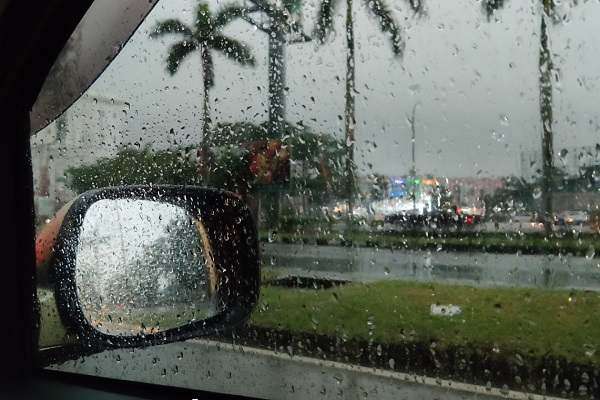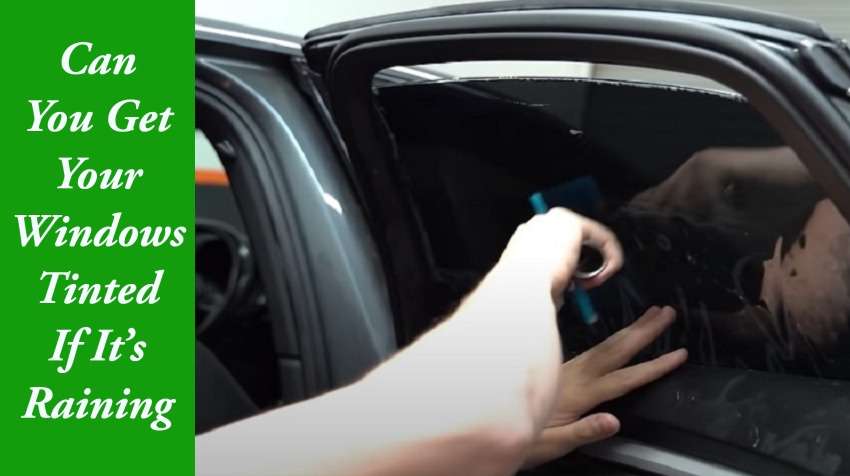If you haven’t had your car’s windows tinted, you should give it some serious thought. Your automobile will look much nicer, stay cooler in the summer, and help shield you from UV radiation if you get tinted windows.
You made your mind up on tinting your car’s windows, but find yourself in a streak of rainy days. So, can you get your windows tinted if its raining? Does the weather even affect window tinting in the first place?
The quality of the tinting process can be greatly influenced by the weather. You want to make sure the window tinting lasts the lifespan of the car after spending all that money on it. This article will cover the benefits and drawbacks of having a window tint while it is raining. As well as, the safety precautions that should be taken and why they are advised.
Can You Get Your Windows Tinted If It Is Raining?
Yes, it is possible to get widows tinted during the rain. It’s mainly because the installation may be done inside the car and the film is put on the inside of the windows or the windshield. Nevertheless, if a few safety precautions are not followed, it is still possible to botch the installation of your window tint.
Although window tinting on a rainy day may create difficulties when applying adhesive or the film itself since the water can infiltrate through cracks or other small spaces in your automobile, the tinting technique is typically unaffected by the rain.
Moreover, the time needed for the adhesive to dry can also lengthen if it’s raining. As a result, it is suggested to not roll down the windows for as long as three to five days to minimize the water coming in contact with the film.
It is also recommended to leave the car outside when it’s not raining and place it under the sun so that it hastens the process of curing. Which is the adhesive drying out. A tint job can easily be ruined if it does not cure properly making the film prone to falling off, starting from the edges of the window.
What If Your Windows Tinted When Its Raining?

Having tinted windows when it’s raining can be quite dangerous, it can lead to numerous difficulties leading to accidents.
On a rainy day, dark-tinted windows can make it very challenging to see properly, especially while driving at night. Therefore, high-quality window tint films with the right properties should be used so that your ability to see the road ahead clearly is not hindered.
Especially if you live in a place where it usually rains. Your local window tint shop should know exactly which film to install to tackle this problem.
Heavy rain and a dark window tint can make it very hard to navigate through an unfamiliar area, making it difficult to spot and read road signs.
Will Rain Damage Window Tint?
The simple answer to the question above is that the rain has no effect on the tint as it is installed on the glass which is facing the inside of the car as mentioned earlier.
However, it can still harm your tint if there are tiny gaps in the car. The frame of your window, or windshield for water to seep in between the film and the glass, dissolving the adhesive of the film.
Does The Rain Affect A Newly Tinted Window?
If you ever had the thought of whether rain affects your new window tint, you’re not alone. The rain does not affect a newly tinted window as the film is installed on part of the glass which is inside the car.
Therefore as long as the rain is not seeping through your door and flowing on the film, you’re completely fine.
What Is The Best Season For Tinting Windows?
If you’re assuming summer, you’re partially right, yet each season has advantages and disadvantages when it comes to window tinting. It ultimately depends on your circumstances. To help you make the best decision, we will also go over the benefits and drawbacks of tinting windows throughout the year.
Fall and Spring
The ideal season to tint windows is typically either spring or fall. Those particular seasons’ low humidity levels and mild temperatures guarantee that the applied tint will stick to the glass correctly.
Rain and humidity in the spring can be problematic, particularly in the south. It may be challenging to tint during the long summer and warmer fall.
Winter and summer
The hot air can hasten the curing process of the window tint during the hotter summer months. That’s advantageous. However, a high humidity level can make the tint installation more challenging.
On the other hand, tinted windows during the winter might make drying a challenge. If you choose to tint your windows during the winter, you might need to wait a bit longer before using them so that the tint has time to fully dry.
Speaking of prices, you might be shocked to learn that getting your windows tinted during the winter or wet months could result in savings. During the winter and rainy seasons, there are fewer requests for window tint.
Therefore, a window tint job can be done at a fraction of the cost compared to doing it during the summer; when the demands are at an all-time high.
Conclusion
Tinting windows is a great investment. Additionally, tinted windows might aid in maintaining the interior of your automobile by preventing sun damage to the upholstery.
But can you get your windows tinted if its raining? Tinting your automobile windows is no hassle if you live in a hot environment with year-round sunshine. However, this procedure becomes more difficult if you reside in a location where it rains frequently.
Your windows can be tinted all year long if the window tinting company you hire has a temperature-controlled facility where they operate. If not, waiting until fall or spring will yield the best results. Since it is your money, you want to maximize your investment’s return.

